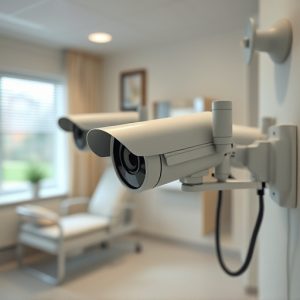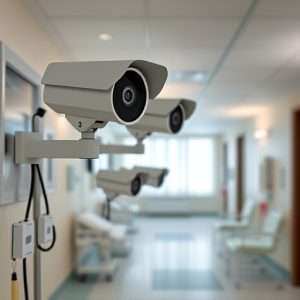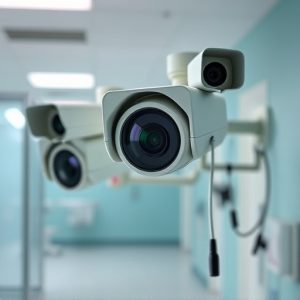Enhancing Elderly Care with Discreet Surveillance: A Guide to Ethical Camera Usage in Nursing Homes
Cameras for nursing homes have transformed elderly care by offering advanced monitoring systems tha…….
Cameras for nursing homes have transformed elderly care by offering advanced monitoring systems that enhance the attentiveness and responsiveness of eldercare services. These high-definition cameras, placed strategically within communal and private areas, use motion detection and AI to provide real-time oversight of seniors' well-being, allowing for swift intervention when needs arise. They track daily routines and detect potential health concerns or distress signals, enabling caregivers to act promptly and improve the quality of life for elderly residents. Privacy is a top priority in the design of these systems, which follow strict data handling protocols to maintain confidentiality and comply with regulations. The deployment of such technology not only reassures residents and their families but also optimizes staff allocation and operational efficiency within nursing homes. This technological advancement signifies a significant progression in eldercare services, offering a glimpse into the future of aged care through the thoughtful application of surveillance systems that balance privacy and security with dignity and ethical considerations.
In recent years, the intersection of technology and elderly care has become increasingly pivotal, particularly within the realm of monitoring in nursing homes. This article delves into the transformative impact of integrating advanced cameras for nursing homes as part of care monitoring systems. It explores how this discreet surveillance not only enhances the safety and well-being of residents but also maintains their privacy with ethical considerations at its core. By examining best practices in camera usage, we aim to provide a comprehensive guide for assisted living facilities to navigate this delicate balance effectively. Join us as we illuminate the path for safer, more dignified care through the responsible use of technology in elder care settings.
Leveraging Technology for Enhanced Elderly Care Monitoring with Cameras in Nursing Homes
In recent years, the integration of technology in nursing homes has significantly advanced elderly care monitoring, offering a more attentive and responsive approach to eldercare. Cameras for nursing homes have become pivotal tools in this advancement, providing real-time visual oversight that can detect and respond to residents’ needs promptly. These high-definition cameras are strategically placed within communal areas and private rooms, equipped with motion detection and AI-driven analytics to monitor the well-being of seniors around the clock. They enable caregivers to track daily routines, detect unusual behaviors that may indicate health issues or distress, and even alert staff to emergencies instantaneously. This proactive approach ensures that elderly residents receive immediate attention, reducing response times and enhancing their quality of life. Moreover, these camera systems are designed with privacy in mind, employing strict data handling protocols to safeguard residents’ confidentiality and comply with all applicable regulations. The introduction of cameras for nursing homes represents a significant leap forward in elderly care monitoring, offering peace of mind for both the residents and their families, while simultaneously optimizing staff allocation and operational efficiency within these facilities.
The Role of Discreet Surveillance in Maintaining Privacy and Safety for Residents
In the realm of elderly care monitoring, the integration of discreet surveillance within nursing homes strikes a delicate balance between privacy and safety. Advanced cameras for nursing homes are designed with small, unobtrusive lenses that provide continuous observation without infringing on residents’ personal spaces. These cameras ensure that staff can monitor the well-being of residents without overt intrusion, fostering an environment where privacy is respected while security remains a priority. The footage captured by these devices can alert caregivers to potential health issues or signs of distress in real-time, enabling prompt intervention and medical attention when necessary. This proactive approach to monitoring not only enhances the safety of residents but also provides peace of mind for both the elderly and their families, knowing that any instance of distress or adverse event can be swiftly addressed.
Moreover, the deployment of cameras for nursing homes is complemented by sophisticated software that analyzes footage to detect anomalies in behavior patterns, which could indicate a decline in health or an environmental hazard. The system’s ability to learn and adapt over time means it becomes more effective at identifying genuine concerns, reducing the likelihood of false alarms. This technology, when ethically implemented with resident consent, represents a significant stride forward in elderly care, where safety and privacy need not be mutually exclusive. It is through such thoughtful applications of surveillance that nursing homes can offer a secure and dignified living environment for their residents.
Implementing Best Practices for Ethical Camera Usage in Assisted Living Facilities
In recent years, the integration of cameras for nursing homes has become a focal point in enhancing elderly care monitoring. As technology advances, it is imperative to implement best practices that prioritize the privacy and dignity of residents while ensuring their safety and well-being. Ethical camera usage in assisted living facilities requires a delicate balance between surveillance and respect for individual autonomy. By adopting transparent policies regarding when and how cameras are used, nursing homes can foster an environment of trust and security. It is crucial to ensure that video monitoring is limited to common areas or with the explicit consent of residents and their families for personal rooms. Furthermore, staff training on privacy laws and ethical surveillance practices is essential to maintain a respectful and safe living atmosphere. The use of cameras for nursing homes should be accompanied by secure data handling protocols and regular audits to uphold the integrity and confidentiality of the footage. This not only aligns with ethical standards but also builds community confidence in the care provided, ultimately contributing to the establishment’s reputation and legal compliance. By prioritizing ethical considerations in the deployment of cameras for nursing homes, assisted living facilities can offer a harmonious blend of safety, transparency, and respect for their residents.


